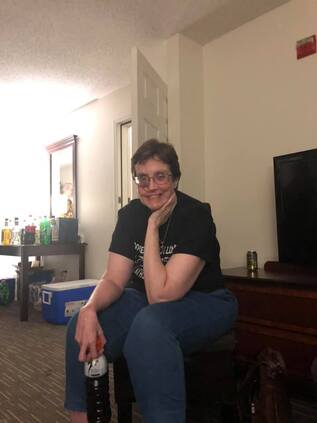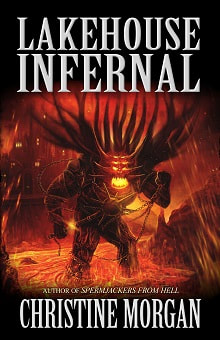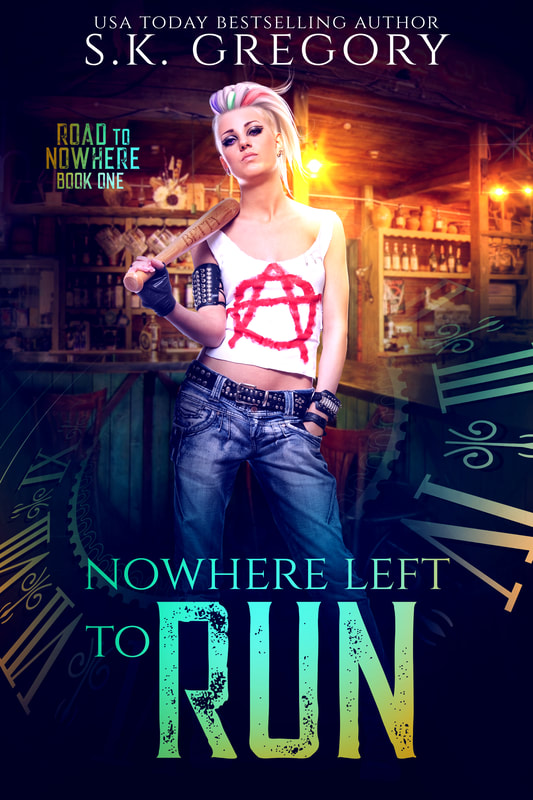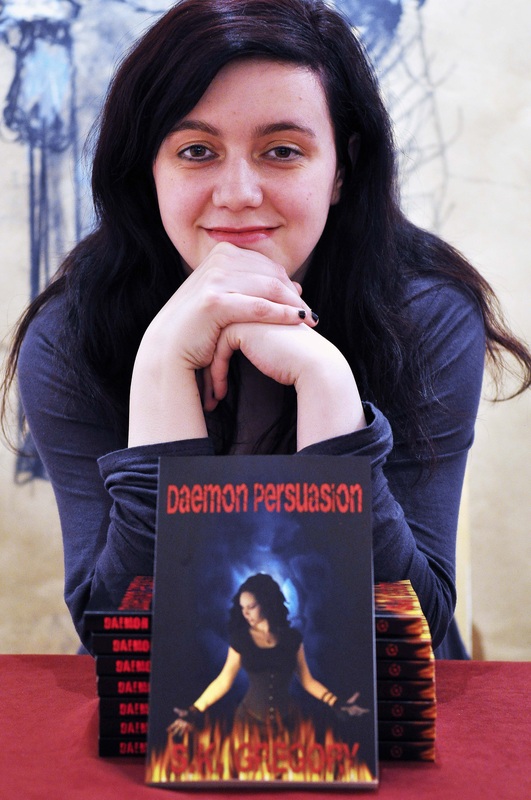|
I’m The What? by Christine Morgan Just within the past few months, I’ve found myself dubbed both “the Martha Stewart of extreme horror,” and “the female Edward Lee.” Well, no pressure, right? Hardly daunting, right? Not much to have to live up to, right? Hahahahahaha(help). I was the what? I was? Me? The first was bestowed after my appearance on the Bizzong podcast, earned in part no doubt by my reputation for bringing baked goods to events (often themed for the occasion; at my Murder Girls release, I had cupcakes topped with little blood-spattered bowling pins as a reference to one of the characters’ weapon of choice; brought real dried bugs in “amber” jello to a Jurassic Park party, etc.). Earned in part, also, for my other hobby of weird crafts. I modify fashion dolls into twisted creations and make little nut-people or puffball or other such things inspired by horror movies, video games, the books of fellow authors, Halloween, and so on. I’ve made buttons for swag giveaways, centerpieces for conventions; if someone needs party favors, I’m your gal. So, okay, fair enough, once the initial shock passed, I could see it. Not sure what the real Martha Stewart would have to say about it, but I like to hope she’d be amused. I’m certainly no threat to her culinary and crafting empire. (As a side note, one of the first follow-up questions I got after that moniker went public was, “so then, who’s your Snoop?” … the answer was obvious and immediate: Jeff Burk, formerly of Deadite Press, now head of Section 31 Productions, one of my favorite people in the whole world. He was all too glad, even gleeful, to accept the designation.) As for the other title, the “female Edward Lee” thing, that reputation probably got going with my trashtastic Deadite debut, Spermjackers From Hell. I mean, reputation-wise, once you do a book with a title like that, especially when you’ve already published minotaur smut and some hardcore Viking stories gross and violent even by Viking standards, you’re already on your way, I suppose. When it fully solidified itself, though, was with the release of Lakehouse Infernal, which wasn’t just a Lee-type book but an author-approved sequel tying into his Mephistopolis series. I’d already been a fan of Lee’s for years. Had reviewed almost everything in his catalog, had met him at cons and corresponded, gotten good feedback from him on some of my own writing. He’s even put me to work as a proofreader and editorial assistant (which has led to some interesting email exchanges regarding … certain of his word-choices and terminology, shall we say). Great guy, total sweetie, can’t say enough good things. Yet there he is, producing some of the sickest of the sick fiction anyone will ever find. To be listed in the same category, let alone put anywhere near on the same level, is an honor I’m still having a hard time wrapping my head around. But, however unworthy imposter syndrome may make me feel, I do like to think there’s something to it. I hope to live up to the comparison. And, if I’m being honest here – what the hell, why not? – I hope to keep going. I hope to push it, take it further. I want to keep playing in his sandbox, building on and expanding. I want to write more Mephistopolis stories. To collaborate with him, hey, dare to dream! To delve into the more feminine depths of mythology, folklore, and psyche, which is where I believe the origins of all our best horror comes from. Think about it … the first horror stories we hear, the ones we grow up with … think about where they come from, and who tells them to us. Sure, they call them ‘fairy tales’ now, as if to lighten-and-fluff them, diminish them, make them silly and frivolous and harmless. Y’know, like the genre as a whole has done to a gender as a whole for centuries now and it’s maddening we still have to have a Women-In-Horror month year after year to stand up and holler and remind them not only are we here, we’ve been here all along! Deep breath. Okay. Moving on. Look at those ‘fairy tales’ our mothers and grandmothers told us. Really take a good hard look some time. They are dark. They are horror stories. Loss, death, betrayal, curses, monsters! Way back in ye olden days, the women were trying to warn their children, to frighten them. Consider how many revolve around the death of a mother, or an evil stepmother. People scoff about that in Disney films now, but consider … that was the mother’s own fear coming through. What if I died? she’s asking herself. What would happen to my babies? Who would take care of them? What if their father married some wicked selfish thing who might want to get rid of or hurt them? Tell me that’s not horror. Way before Shirley Jackson and Mary Wollestonecraft-Shelley, oh, we women already had and knew horror. We knew it well. It’s still there. It’s always been there. Our horrors are the core of everything. It’s just, at some point, all the male-dominated stuff bulled in and took over. There were heroes, and soldiers, and princes, and gods to stand in the spotlight and wave their … swords, of course I was going to put ‘swords.’ Sitting down to write Lakehouse Infernal, I don’t recall deliberately setting out on purpose to bring an emphatic strong female perspective to Lee’s universe (or, more of a one; on only casual familiarity with his work, it’s easy to miss, but it’s there), and even less any plans of doing so to make a point or anything. I didn’t go at it all, “I’mma do a Mephistopolis reboot with all female leads and chortle at each dudebro ragefit as I ruin their childhoods like they did with Star Wars and girl-cooties Ghostbusters!” (admittedly, my approach to Spermjackers From Hell may have been closer to that attitude; a lot of the stuff in that book was totally done on purpose). But, no. With Lakehouse Infernal, I went into it with a scenario, and a bunch of characters, and ideas for diabolical atrocities. Not to make a statement or push any agenda. Having it turn out to have a more female-focused theme, well, it just sort of … happened. There are explorations of various aspects of the mother-daughter dynamic, toxic femininity, pregnancy, virginity, themes involving sexual empowerment. Some of the women in the book are victims of terrible acts, but not so much victimized, if you get my drift (a few of the male characters wish they were so lucky!). They have agency and identity, strengths, weaknesses, powers, faults. Some of them are good people. Some aren’t. Some start off not so nice and end up downright horrible. Even the angel has quirks and flaws. And, okay, yes, there is a character made entirely of boobs … but that one was kind of to make a point, if only in fun. And, okay again, yes, the ending surprised even me. When I realized where particular story arcs were headed, I had to take myself for a walk and sit myself down for a talk, ask myself if I was sure (as if I had any choice; by then I knew it was too late for backing out). I’m not sure how much, if any, of this does make me “the female Edward Lee.” But, while I may never know what Martha Stewart might think, I have it on personal authority that Lee gets almost as big a kick out of it as I do. So, thank you; I will continue trying to live up to the honor! (I’m thinking Warlock Infernal for a sequel, how’s that sound?) Christine Morgan is twice-married, twice-divorced, twice a cancer survivor, and springs from the more twisted branch of an otherwise fairly normal family tree. She currently resides in Portland, Oregon, where she works the overnight shift in a psych facility because when it's quiet, she can write on company time. Her home life involves being bossed around by cats. As well as writing, she sometimes dabbles in editing, and has been a longtime regular contributor to The Horror Fiction Review. Her other interests include dinosaurs, superheroes, big stupid disaster movies, and collecting rocks.
Comments are closed.
|
Monthly Newsletter
Categories
About the Author:S. K. Gregory is an author, editor and blogger. She currently resides in Northern Ireland. “Description begins in the writer’s imagination, but should finish in the reader’s.” Archives
July 2024
Categories |
||||||||||||||||||||||||||||||||||||||||||||||||||||||
© 2024 S.K. Gregory
Proudly powered by Weebly







 RSS Feed
RSS Feed

